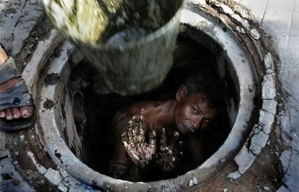
For many in the lowest caste system in India, a people known as the Dalit, turning to Christ has brought them increased persecution in an already oppressive society. Left to work only the most menial jobs in the country, they will now lose the government benefits once reserved for the Dalit unless they choose to renounce their Christian faith and return to Hinduism.
Ultimately, they will be stripped completely of Dalit status - a group formerly known as untouchables.
An estimated 25 million Dalits in India have converted to Christianity, the organization International Christian Concern reported yesterday, and are now forced to choose between their faith and government programs available only to those of a select religious background in the Scheduled Caste system.
For Dalit Christians, oppression comes both before and after conversion. As the lowest members of society, they live in poverty, and under the rulings of the Scheduled Caste Order of 1950.
The 64-year-old order defines who can receive India's Scheduled Caste benefits which were first introduced as a means of assisting the Dalit to rise above their place in the caste system.
But now, Christians denied those benefits foresee a grim future for themselves and their children even though the Indian Constitution states that citizens will not be discriminated against based on their religion.
In early October, India's social justice minister, Thavar Chand Gehlot, stated that India should not provide government job and education assistance to the Country's poverty-stricken Christians.
"Allowing SC status to converts would provide a fillip to religious conversions," Gehlot said. "The demand is not constitutional and we want to work within the parameters of the statute for the welfare of these communities."
Gehlot's comments extend to Christians and Muslims at the bottom of the caste system.
But the problem for true converts to Christianity lies in the admittance of many low-caste Hindus and Tribal members who converted for the purpose of removing the discrimination brought about by their caste status. This has supported Gehlot's argument that Christian's are seeking to "double dip" into benefits - as both a Dalit and a religious convert.
"They converted to other religions because untouchability did not exist there. The conversion has solved the problems they faced as Hindus. So, they should not ask for SC status," he argued. "Now, if they get SC status, they will be eligible for dual benefits."
Over the past month, Hindu militants have targeted both Muslims and Christians in an attempt to reconvert them back to the religion that is practiced by 80 percent of Indians.
On Dec. 1, one of the largest churches in New Delhi burned to the ground due to arson, and less than two weeks later a group of about 30 Hindu radicals attacked a Christian pastor and members of his congregation as they sang Christmas carols in the central city of Hyderabad. Pastor Bhim Nayak of Banjara Baptist Church was left unconscious and covered in blood after the attack.
On Christmas Day, The New York Times editorial board delivered an opinion piece which discussed police investigation into accusations that people in India have been induced to participate in mass conversion meetings by a combination of intimidation and bribery, including the promise of food ration cards.
Incidents like these shed light on the harsh realities of the country's archaic caste system, and point to a government that is turning its head to increased religious intolerance in India.
In an effort to help end attacks against Christians, the ICC started a new petition, sent earlier this month to Indian Prime Minister Narendra Modi.
The petition letter closes with, "No citizen of India should have to fear for their life simply because of their religious identity, and the international community is eagerly awaiting any sign that your government has the desire or will to confront this pressing issue."
For Dalit Christians, the increasing threat of persecution from the government and violence at the hands of militant Hindus is woven into their daily lives.
As The New York Times editorial board wrote, "...Mr. Modi must break his silence and issue a stern warning to emboldened Hindu militants before their actions turn further progress on economic reform into a sideshow, with the politics and divisiveness occupying center stage."






